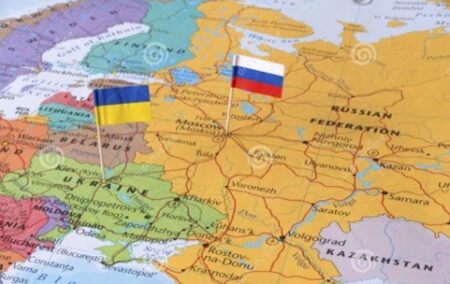As Russian forces continue their offensive into Ukraine, reaction from around the world has been varied. A resolution at the United Nations Security Council calling on Russia to cease its campaign and withdraw its military from Ukraine attracted 11 votes in favour – Albania, Brazil, France, Gabon, Ghana, Ireland, Kenya, Mexico, Norway, the United Kingdom and the United States. China, India, and United Arab Emirates abstained, while Russia used its veto power on the resolution.
After the resolution was presented, a joint statement was signed by 51 countries condemning Russia’s action. Most signatories were the ‘Western’ bloc – including non-Nato nations such as Sweden and Finland – along with broadly allied countries such as Japan and South Korea. Further signatories included Colombia, Lesotho and Palau.
Western powers have taken the lead in condemnation of Russia. No country has committed any forces to Ukraine’s defence, although some have been willing (or indicated a willingness) to provide weapons. Among the latter is Germany – which will provide anti-tank and anti-aircraft weapons – and which has previously raised eyebrows for providing Ukraine with a consignment of helmets. Australia has also indicated that it would provide funding for weapons for Ukraine.
Germany has also agreed to support the removal of Russia from the SWIFT banking payment system. This departed from an earlier position, in which Germany appeared to be sensitive to its considerable economic relationship with Russia. A number of European countries have also suspended landing rights for Russian airlines.
Ukrainian refugees have been entering neighbouring countries such as Poland and Romania. Polish authorities estimated by Saturday that around 100 000 Ukrainians had entered the country. Hungarian Prime Minister Victor Orban, known for a hard-line position on immigration, has remarked that his country was letting ‘everybody’ in. Greece has said it is willing to accept the ethnic Greek community of Ukraine.
NATO has deployed additional troops to countries bordering Russia and Ukraine. Jens Stoltenberg, NATO Secretary General, warned that Russia’s goals were not confined to Ukraine and that it had demanded the withdrawal of all NATO forces and infrastructure that had been placed in countries that had joined the alliance since 1997.
A number of sports bodies, such as Norway’s ski federation and the football organisations of Poland and Sweden, have refused to compete against Russian teams.
For China, the prospect that it might attack Taiwan on grounds not dissimilar to those invoked by Russia has arguably caused it to tread carefully. China has refused to describe Russia’s actions as an invasion, couching its commentary in general terms: ‘It is absolutely imperative that all parties exercise necessary restraint in order to prevent the situation in Ukraine from deteriorating or even getting out of control. The safety of ordinary people’s lives and properties should be effectively safeguarded, and in particular, large-scale humanitarian crises have to be prevented.’
India has not condemned Russia, nor termed its actions an invasion. India has a long-standing relationship with Russia, but also a growing relationship with the US.
Venezuela and Cuba blamed NATO and the US for the crisis, while Brazil has said that its position is not ‘neutral’ but ‘balanced.’
The position of most African countries remains unclear; Russia has been on a diplomatic offensive on the continent for some years. Kenya’s representative to the UNSC spoke harshly about Russia’s actions, but the African Union has limited itself to expressing concern. The leader of the Central African Republic is reported to have supported Russia’s actions.
President Cyril Ramaphosa has called on the UNSC to take an active role in resolving the crisis, and South Africa’s Department of International Relations and Cooperation (DIRCO) called on Russia to withdraw its forces. However, the Sunday Times reported that the president was not in agreement with the position taken by DIRCO. A report in the Sunday Times said that there were people within the DIRCO bureaucracy who were opposed to South Africa’s close relationship with Russia. As President Ramaphosa did not support that perspective and valued the relationship with Russia (the latter country having also made its displeasure clear), a further statement would likely contradict this position.

